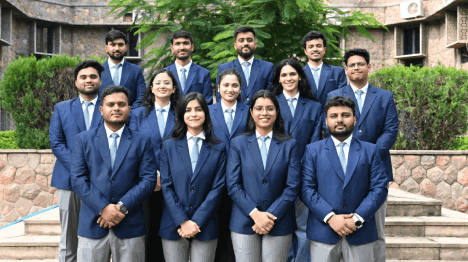- About Us
-
Academics
Schools
Programs
General Information
-
Faculty
The faculty members and researchers working at IIHMR University come from varied backgrounds including, but not limited to medicine, public health, management, economics, statistics, demography, human geography, social and behavioral sciences, rural development and pharmaceuticals.
-
Admissions
- Research
Publications & Journal
- Executive Education
Executive Programmes
- Online Certification Courses
ONLINE CERTIFICATION Courses
- Training
- Placements
- Contact
- Pradanya
- Blog
- Fee Payment
- NAAC
- IQAC
- NIRF
-
About Us
- About IIHMR University
- Board of Management
- Academic Council
- Board of Studies
- Research Board
- Institutional Review Board
- Finance & Audit Committee
- Departmental Research Committee
- Chairperson's Message
- President's Message
- IIHMR University Act
- Infrastructure
- Collaboration
- Ranking
- Board of Studies (School of Digital Health)
- Awards & Accolades
-
Academics
- Institute of Health Management Research
- School of Pharmaceutical Management
- ML Mehta School of Development Studies
- School of Digital Health
- SD Gupta School of Public Health
- MBA (Hospital and Health Management)
- MBA (Pharmaceutical Management)
- MBA (Development Management)
- MBA (Healthcare Analytics)
- Master of Public Health
- Student Manual – Cohort 9 (2021-2023)
- Master of Public Health (Offered by Johns Hopkins Bloomberg School of Public Health, USA in cooperation with IIHMR University, Jaipur, India)
- Ph. D.
- MBA CSR & ESG Management (Executive)
- MBA Sustainable Business Management (Executive)
- Common Information for all the Programs
- Academic Calendar
- Student Handbook 2020-21
- Committees
- Policies
- Annual Exam Calendar
- Library
- Faculty
- Officers of University
- Dean of Institute of Health Management Research
- Dean of School of Pharmaceutical Management
- Dean of School of Development Studies
- Dean of SD Gupta School of Public Health
- Dean of School of Digital Health
- School of Digital Health
- Faculty List A to Z
- Faculty List Designation Wise
- Faculty List School Wise
- Admissions
- Research
- Executive Education
- Training
- Placements
- Alumni
- Events
- Job Openings
- Contact
- Research
Evaluation of Adolescent Friendly Health Clinics initiated in Maharashtra
Agency : UNFPA, Maharashta
Adolescents Reproductive and Sexual Health (ARSH) servIces have received a high priority in health services quite recently. In Jine with the strategy of Ministry of Health and Family Welfare, Government of India, the state of Maharashtra has taken an important initiative to start ARSH and set up Adolescents Friendly Health Clinics (AFHCs) at the district hospitals and sub-district hospitals in the entire state. Since 2008, 73 AFHCs have been created and made functional. The UNFPA, Maharashtra commissioned a quick study of AFHCs to assess the current situation with respect to infrastructure, functional status, and attitude and perceptions of the healthcare providers and adolescents.
The broad objective of the evaluation was to assess whether the basic standards/principles of adolescent friendly health service are being followed. The specific objectives of the evaluation were to assess:
- Is service environment conducive for adolescents to seek health services? (i) What is the service delivery package? (ii) How are services organized? (clinic location, sign age reflecting location, clinic timings, audio-visual privacy, name of the ARSH clinics that appeals to adolescents) (iii) Are clients, information material, equipment and supplies available at the clinics?
- Are service providers trained for provision of ARSH services?
- Is information available to adolescents regarding availability of good quality services? (Activities undertaken to promote availability of AFHC, linkages developed to inform adolescents regarding clinics)
- Are management systems In place to improve/sustain provision of services?
Out of the 73 facilities, 25 facilities were selected randomly for the study. The study was carried out using quantitative as well as qualitative techniques of data collection. The facility survey was carried out using a semi-structured questionnaire. An observation checklist was prepared to observe service provision. The interviews of the service providers were carried out using semi-structured interview schedules. A semi-structured questionnaire was prepared for the adolescents. Additionally, observations and review of records were undertaken for the existing management in formation system.



